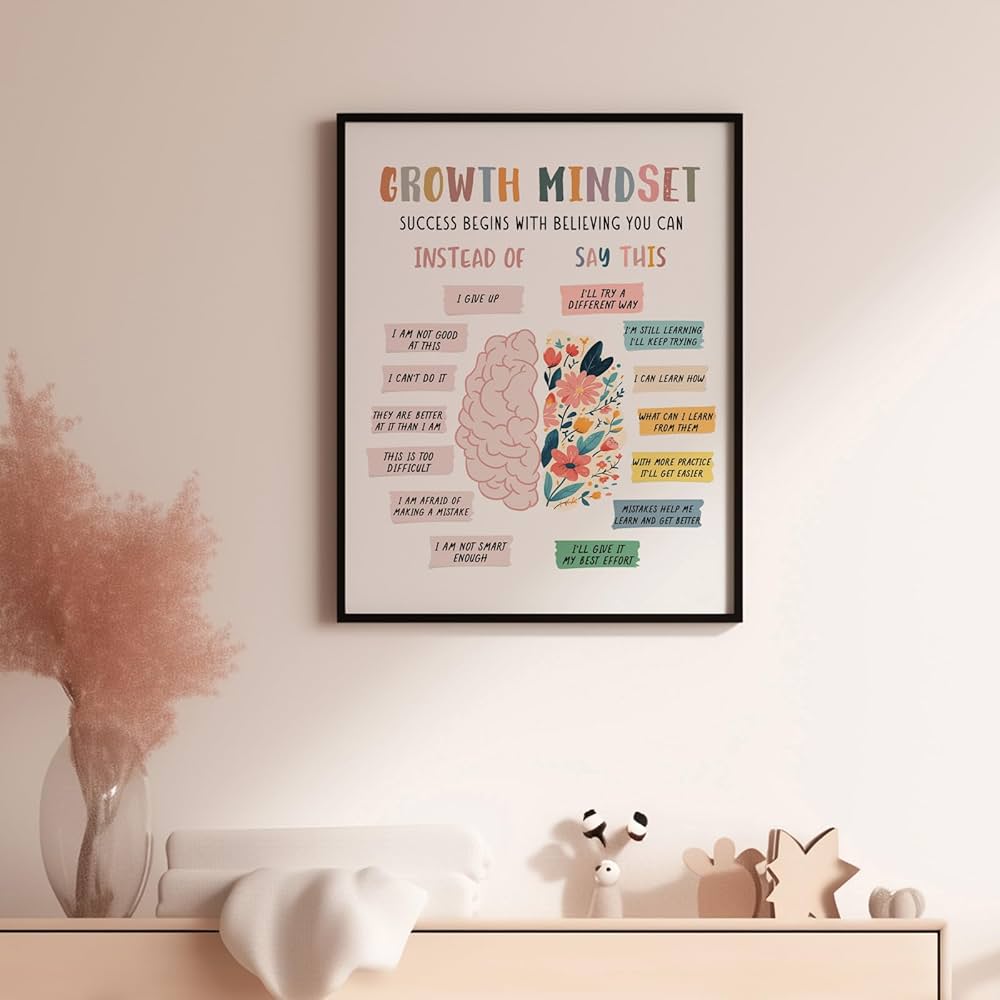The Power of Positive Affirmations in Building a Growth Mindset

Unleashing Potential Through Words
In a world where challenges are inevitable, the way we perceive setbacks can significantly shape our personal and professional growth. The practice of using positive affirmations has emerged as a powerful technique within the realm of growth mindset methodologies, empowering individuals to overcome obstacles and embrace learning opportunities. By reshaping the way we speak to ourselves, we pave the way for a more resilient outlook and a belief in our ability to evolve.
Understanding the mechanics of this approach is essential for anyone looking to enhance their life’s journey. As we delve into the significance of positive affirmations, we will explore:
- Key benefits of adopting affirmations in daily life
- Techniques for crafting effective statements
- Real-life examples of success
- The science behind positive self-talk
- Practical tips for integrating affirmations into your routine
Get ready to uncover the top five positive affirmations that can catalyze your mindset transformation and inspire you to unlock your potential like never before.
SEE ALSO: Click here to read another article
The Importance of Positive Affirmations in Building a Growth Mindset
In today’s fast-paced world, where the influence of negativity can be profound and pervasive, the concept of positive affirmations emerges as an invaluable tool for those seeking to cultivate a growth mindset. These simple yet powerful statements can be instrumental in transforming how we perceive challenges, setbacks, and opportunities. By deliberately steering our minds towards optimism and resilience, we can actively remodel our mental landscape. In this article, we will delve into the top five reasons why positive affirmations are crucial for building a growth mindset, offering insight, clarity, and perhaps a catalyst for readers to embark on their personal journey of transformation.

5. Boosting Self-Esteem
At the heart of positive affirmations lies their profound impact on self-esteem. The repetition of affirmations such as “I am capable” or “I am deserving of success” isn’t just motivational rhetoric; it gradually builds an improved self-image that can have real-world effects. As we repeatedly affirm our self-worth, our perception of ourselves shifts from one of doubt to one of confidence.
This increase in self-esteem encourages individuals to approach life with a sense of empowerment, taking on challenges that may have once seemed insurmountable. When people internalize these affirmations, they often develop an inner resilience, becoming less swayed by external criticisms or societal expectations. This enhanced self-assurance can, in turn, lead them to explore new ventures, unlocking potential that was previously dormant.
4. Resilience in the Face of Adversity
Throughout life’s journey, adversity is inevitable. However, those who harness the power of positive affirmations often develop robust resilience, enabling them to confront obstacles with fortitude. Seeing failures not as an end but as learning opportunities is crucial to maintaining motivation and persistence.
Here are some affirmations that bolster resilience:
- “I learn and grow from every experience.”
- “Every failure is a stepping stone to success.”
- “I have the strength to overcome challenges.”
Incorporating these affirmations into daily life can help individuals transform setbacks into comebacks, fostering a deep understanding of their strengths and weaknesses. This resilience is not just about bouncing back from failure but about thriving in the face of adversity, ready to tackle the world’s unpredictability with a strengthened spirit.
3. Creating a Positive Internal Dialogue
The internal dialogue that plays in our minds shapes our emotional and psychological states more than we often realize. For many, this self-talk can spiral into cycles of anxiety, stress, and self-doubt. Positive affirmations provide a practical means to disrupt these negative patterns, encouraging a more constructive inner dialogue.
By swapping negativity for positivity, we alter our cognitive processes, reducing stress and anxiety while enhancing our coping mechanisms. This shift is not just beneficial for immediate mental health; it also influences how we make decisions and interact with others, promoting a more proactive, optimistic life view. With a more supportive internal dialogue, we greet challenges with curiosity and openness, rather than fear and hesitation.
2. Fostering a Growth-Oriented Perspective
A growth mindset thrives on the belief that our capabilities aren’t static; they can evolve and improve with effort and dedication. Positive affirmations play a pivotal role in embedding this belief into our daily lives. Statements like “I embrace challenges” or “I thrive in learning new skills” reinforce our resolve to seek growth.
This perspective encourages continual learning and adaptation, prime ingredients for personal and professional development. By fostering such an outlook, individuals view limitations not as barriers but as stepping stones to innovation and mastery. Persons with a growth-oriented mindset are often more willing to experiment, take calculated risks, and learn from their journeys, propelling them toward new horizons.
1. Initiating Personal Transformation
Perhaps the greatest impact of positive affirmations is their ability to spark personal transformation. These affirmations act as catalysts for change, prompting individuals to explore new possibilities and redefine their potentials. Phrases like “I am always improving” or “I have the power to shape my future” empower individuals to break free from stagnation.
Transformation is not merely about change; it is about realizing potential and dreams. Positive affirmations help navigate this journey by instilling an ongoing commitment to evolving one’s identity. As individuals embrace such change, the effects ripple outward, often inspiring communities and organizations to pursue growth and positivity.
In conclusion, the role of positive affirmations in nurturing a growth mindset is undeniable. By embracing and integrating these affirmations into our routines, we can cultivate improved self-esteem, resilience, a positive internal dialogue, a growth-oriented perspective, and ultimately, significant personal transformation. The journey of growth begins with a single positive thought; embrace it, and watch as it leads to a world of limitless opportunities.
| Category | Description |
|---|---|
| Empowerment | Positive affirmations serve as a tool for self-empowerment, enabling individuals to take control of their narratives and influence their personal development. |
| Resilience | Regularly practicing positive affirmations can enhance mental resilience through positive thinking, allowing individuals to better cope with adversity and setbacks. |
| Self-Confidence | Affirmations can significantly boost self-confidence, with repeated affirmations fostering a belief in one’s abilities and potential, which can lead to greater achievements. |
| Focus and Clarity | By aligning thoughts with aspirations, positive affirmations help individuals maintain focus and clarity on their goals, which is crucial in cultivating a growth-oriented mindset. |
The impact of positive affirmations on the development of a growth mindset cannot be overstated. These categories not only highlight the advantages but also open avenues to investigate how these affirmations resonate within psychological frameworks and influence overall well-being. For instance, the concept of empowerment addresses the foundational principle that individuals can sculpt their destinies through deliberate thought processes and affirmations. Moreover, resilience is a critical trait in today’s fast-paced world. Individuals equipped with a resilient mindset tend to view challenges as opportunities rather than obstacles, an idea that is profoundly supported by numerous studies on positive psychology. Experiencing setbacks can be daunting, but when embraced through the lens of affirmations, such experiences transform into stepping stones towards success. Self-confidence is another pivotal aspect that is nurtured through the use of affirmations. The simple act of stating one’s potential can create significant psychological shifts. As individuals repeat affirmations, they construct a narrative that emphasizes their strengths and capabilities, which can lead to engaging in more ambitious endeavors.Maintaining focus and clarity through affirmations further enriches the journey towards personal and professional growth. By articulating specific goals and visions, individuals can drown out the noise of negativity that may surround them, thereby honing in on their aspirations with precision.As the dialogue surrounding positive affirmations continues to grow, this exploration unveils the multitude of benefits that come not just from the practice itself, but also from understanding its underlying principles and applications in everyday life.
SEE ALSO: Click here to read another article
Frequently Asked Questions about Positive Affirmations and Growth Mindset
What are positive affirmations, and how do they work?
Positive affirmations are simple, yet powerful, statements that we consciously repeat to influence our thoughts and behaviors. By consistently using affirmations, we can rewire our brains, replacing negative or limiting beliefs with more empowering ones. This process works on the principle that our thoughts can shape reality, as they guide our actions and habits over time. Scientific studies suggest that repeated affirmation practice can lead to strengthened neural pathways, promoting a mindset shift towards positivity and growth.
Can positive affirmations really contribute to a growth mindset?
Yes, positive affirmations can significantly contribute to developing a growth mindset. A growth mindset is the belief that abilities and intelligence can be developed over time through hard work and perseverance. Affirmations encourage this way of thinking by consistently reinforcing the potential for growth and improvement. Research has shown that individuals who regularly use positive affirmations are more likely to take on new challenges, persevere in the face of setbacks, and achieve their goals.
How should one integrate positive affirmations into daily routine?
Incorporating positive affirmations into your daily routine can be simple yet meaningful. It begins with choosing affirmations that resonate personally, focusing on areas you’d like to develop. You can repeat these affirmations in the morning, during meditation, or even before bedtime. Some people find placing written affirmations around their living space helpful as visual reminders. Experts recommend consistency and belief in the affirmations’ truth, as these factors enhance their effectiveness in nurturing a growth-oriented mindset.
Are there any scientific studies supporting the effectiveness of positive affirmations?
Yes, there is scientific evidence supporting the effectiveness of positive affirmations. Neuroscientific research using brain imaging techniques has demonstrated that self-affirmations can activate the brain’s reward centers. Moreover, psychological studies point to improved problem-solving skills and increased resilience among those who practice affirmations. It is important to note that while affirmations can be a powerful tool, they are most effective when combined with actionable efforts towards personal growth and development.
ADDITIONAL INSIGHTS: Expand your understanding here
Conclusion
In exploring the role of positive affirmations in building a growth mindset, it becomes clear that these simple, yet powerful statements significantly enhance personal development. Positive affirmations serve as a catalyst, encouraging individuals to embrace challenges, persist in the face of setbacks, and ultimately achieve a transformative mindset shift. This change fosters resilience and a belief in continuous learning and improvement.
Throughout the article, we highlighted the key strategies and insights related to the effective use of positive affirmations. By consistently integrating them into daily routines, individuals can transform limiting beliefs into empowering thoughts, thereby enhancing motivation and productivity. Furthermore, the practice of self-affirmation has been shown to contribute to stress reduction and a more robust self-perception, providing a foundation for a successful and fulfilling life.
The intersection of neuroscience and psychology offers a compelling framework for understanding how our thought patterns influence our abilities. Studies indicate that positive affirmations stimulate areas of the brain associated with self-processing and reward, reinforcing the notion that we can indeed shape our reality through our thoughts. This scientific backing further emphasizes the legitimacy and effectiveness of these tools.
In summary, positive affirmations are more than mere words; they hold the potential to reshape our perception of reality and pave the way for personal growth. By embracing this practice, individuals embark on a journey towards a growth mindset, unlocking doors to new opportunities and insights. As we continue to explore the boundaries of human potential, the integration of positive affirmations into our lives remains a vital and promising avenue.


